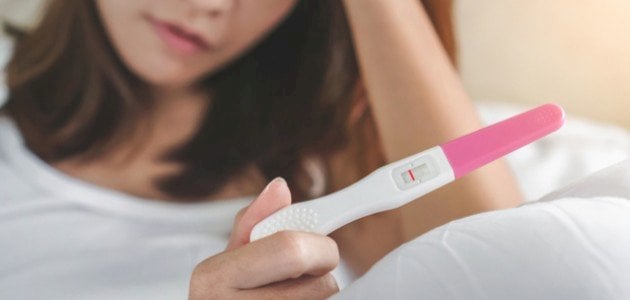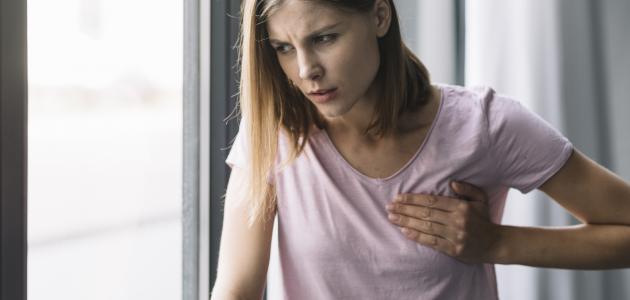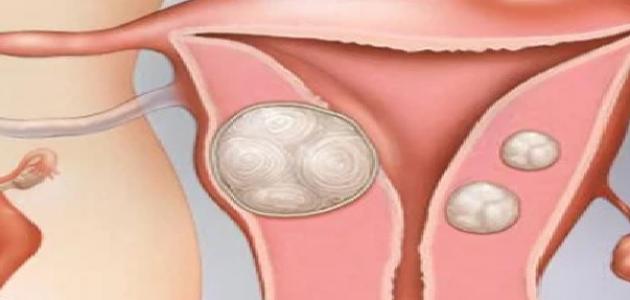Ovarian cysts
The ovaries are considered one of the female reproductive organs whose function is to store the ovaries and release them when the time is right for that. The ovaries are located on both sides of the uterus. Based on the research conducted, it was found that the size of one ovary is the size of a walnut, and one of the ovaries releases a mature egg every month. During a process known as ovulation.
The ovulation process usually occurs in the middle of the month of each menstrual cycle. In fact, eggs are found in the ovaries inside follicles, and they grow and mature there. At the time when the egg release approaches, the level of some hormones in the body rises, including estrogen, for the purpose of preparing the uterine lining for implantation. A fertilized egg resulting from the meeting of the husband’s sperm with a mature egg released from the ovary. If this process succeeds in occurring, pregnancy begins. If it is not successful, the uterine lining sheds during what is known as menstruation, and the first day of bleeding is the first day of the menstrual cycle. .
One of the problems that a woman is likely to encounter during a woman’s life, especially during her reproductive years, is what is known as ovarian cysts, which are defined as fluid-filled cysts that form on a woman’s ovaries. It is worth noting that this problem is very common, and that these cysts are often benign. It is harmless. In fact, there are many causes of ovarian cysts, and most of these cysts disappear on their own, even without the woman receiving treatment, within several weeks of their appearance.
Read also:Symptoms of polycystic ovary syndrome
The effect of ovarian cysts on the ability to become pregnant
Does ovulation occur with a cyst on the ovary? In fact, the effect of ovarian cysts on a woman's ability to get pregnant and give birth depends primarily on the type of cysts formed. There are some types that cause low fertility rates and a decline in the ability to reproduce, while there are many types that do not affect pregnancy at all.
It is worth noting that even if there is a type of cyst that affects a woman’s ability to conceive, there are many treatment options available that increase the chances of pregnancy and having a child. The different ovarian cysts and their effect on pregnancy can be explained as follows:
Ovarian cysts that affect the ability to become pregnant
The types of ovarian cysts that affect the ability to conceive can be explained in some detail as follows:
- Endometrial cysts: (in English: Endometriomas), and these cysts appear on the ovaries as a result of suffering from the health problem known as endometriosis (in English: Endometriosis), which is defined as the growth of the lining layer of the uterus outside of it, and it has been shown that the cysts resulting from this problem may affect a woman’s ability to On pregnancy and childbirth.
- Cysts caused by polycystic ovary syndrome: (in English: Polycystic ovary syndrome), cysts formed on the ovaries resulting from suffering from polycystic ovary syndrome can affect the ability of some women to become pregnant, and this syndrome can be defined as the growth of a number of cysts on the ovaries, and the accompanying irregularity in the menstrual cycle. Menstruation, and disturbances in the levels of some hormones.
Read also:Hydrational cyst on the ovary
Ovarian cysts that do not affect the ability to become pregnant
Functional bags
Functional cysts are the most common ovarian cysts of all, and they do not affect pregnancy and fertility. On the contrary, researchers consider their presence as evidence that the processes required by pregnancy are taking place in the woman’s body in the desired manner. These cysts are of two types, but the first type is known as Follicular cysts, and the second type is known as corpus luteum cysts.
Cystadenoma
Cystadenoma is known as cysts that form in the surface layer of the ovaries. It is worth noting that these cysts do not affect fertility, but they should be treated by a specialist doctor.
Dermoid cysts
Dermoid cysts do not affect a woman's fertility and ability to have children, and are usually composed of things other than fluid, such as hair, skin, or even teeth.
Symptoms and signs of ovarian cysts
Regarding the symptoms and signs of ovarian cysts, it can be said that most cases in which a woman suffers from the presence of ovarian cysts are not accompanied by the appearance of any symptoms or signs, and in cases in which symptoms do appear, they are usually similar to the symptoms of other health problems such as the aforementioned endometriosis, and therefore The specialist doctor does not rely on the symptoms and signs that appear on the woman when diagnosing this problem.
Read also:Symptoms of strong ovulationTo distinguish the difference between the symptoms of pregnancy and an ovarian cyst, the most important and common symptoms and signs of ovarian cysts can be summarized as follows:
menstrual disorders
Does having a cyst on the ovary prevent menstruation? Women with ovarian cysts often suffer from irregular menstruation, and the amount of blood that the body sheds during menstruation may also be irregular, so the period becomes more or less heavy than the previous situation, and it is worth noting that some women who suffer from these cysts have menstrual pain. Their menstruation is very heavy.
Feeling pain in the pelvis
Women who suffer from the problem of ovarian cysts may feel pain in the pelvis that extends to the thighs and lower back, at the beginning or end of menstruation every time.
Gastrointestinal disorders
Digestive disorders associated with an ovarian cyst include:
- Feeling pain when passing urine.
- Frequent need to defecate
- Suffering from pain, bloating, or heaviness in the abdomen.
Urinary disorders
Urinary disorders associated with an ovarian cyst include:
- Frequent need to urinate
- Inability to empty the bladder completely.
hormonal disorders
Ovarian cysts can cause disturbances in the body's hormones, which leads to problems with body hair and breast development, but these disorders are rare.
The danger of having an ovarian cyst during pregnancy
Speaking about the damage of ovarian cysts, it can be said that ovarian cysts do not cause any risks to pregnancy in most cases, but in some cases, especially if the ovarian cyst continues to grow and increase in size, the risk of developing some complications during pregnancy may increase, so the doctor monitors ovarian cysts closely. Periodic ultrasound or magnetic resonance imaging. In some cases, the doctor may prefer to treat ovarian cysts to avoid complications. Among the risks that increase during pregnancy if the size of the cyst on the ovary continues to increase are the following:
- Ovarian torsion.
- Ovarian cyst torsion.
- Rupture of the ovarian cyst.
- Birth complications if the cyst causes an obstruction in the pelvic or abdominal area.
The difference between an ovarian cyst and a gestational cyst
The difference between a cyst on the ovary and a gestational cyst is very large. The gestational cyst is the sac containing the amniotic fluid and the fetus, and it forms between weeks 5-7 of the last menstrual period approximately before pregnancy. It is one of the early signs that the doctor looks for during the first scan. Ultrasound after confirming the pregnancy. As for ovarian cysts, it was discussed previously in the article.









